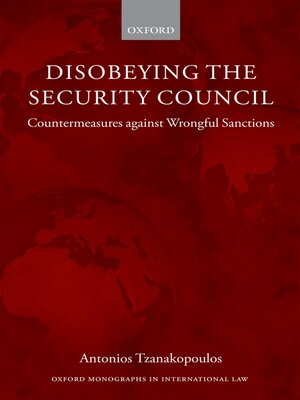Disobeying the Security Council
ebook ∣ Countermeasures against Wrongful Sanctions · Oxford Monographs in International Law
By Antonios Tzanakopoulos

Sign up to save your library
With an OverDrive account, you can save your favorite libraries for at-a-glance information about availability. Find out more about OverDrive accounts.
Find this title in Libby, the library reading app by OverDrive.



Search for a digital library with this title
Title found at these libraries:
| Library Name | Distance |
|---|---|
| Loading... |
This book examines how the United Nations Security Council, in exercising its power to impose binding non-forcible measures ('sanctions') under Article 41 of the UN Charter, may violate international law. The Council may overstep limits on its power imposed by the UN Charter itself and by general international law, including human rights guarentees. Such acts may engage the international responsibility of the United Nations, the organization of which the Security Council is an organ. Disobeying the Security Council discusses how and by whom the responsibility of the UN for unlawful Security Council sanctions can be determined; in other words, how the UN can be held to account for Security Council excesses. The central thesis of this work is that states can respond to unlawful sanctions imposed by the Security Council, in a decentralized manner, by disobeying the Security Council's command. In international law, this disobedience can be justified as constituting a countermeasure to the Security Council's unlawful act. Recent practice of states, both in the form of executive acts and court decisions, demonstrates an increasing tendency to disobey sanctions that are perceived as unlawful. After discussing other possible qualifications of disobedience under international law, the book concludes that this practice can (and should) be qualified as a countermeasure.







